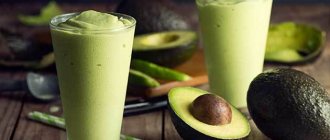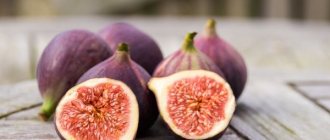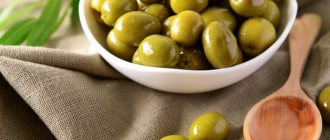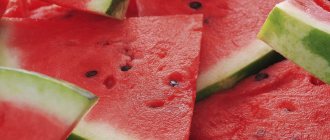During pregnancy, the expectant mother needs to monitor her diet and include not only fresh fruits and dairy products, but also greens. Spinach is the most nutritious type of leafy vegetable. For its unique vitamin composition, it received the title of “vegetable king”. Just 200 grams of spinach per day can meet half of the daily requirement for essential vitamins during pregnancy.
- Benefits for pregnant women
- Contraindications and harm
- How to choose the right one when purchasing
- How and where to store at home
- Precautionary measures
- In what form can it be consumed, what can be prepared and what can be combined with?
General information about spinach
The French rightfully called spinach the “king”, and this is nothing more than a leaf vegetable; spinach received its nickname due to its beneficial properties. Several centuries ago, spinach first appeared in the east. It was then brought by the Arabs to Europe. There they learned how to cook it correctly and exquisitely.
There are 3 basic varieties of spinach:
- Savoy
. This variety has very voluminous leaves. It is found fresh on the shelves of hypermarkets; - Smooth-leaved
. This spinach can be purchased in the form of a ball, as it is stored frozen on the shelves; - Semi-Savoya
. This is a kind of hybrid of the two varieties of spinach listed above. It can be frozen or fresh.
In a cool place, fresh spinach can be stored for only a couple of days, but the frozen product will not spoil for a couple of months, and the quality of the product will not suffer in any way.
Is spinach ok for pregnant women?
Return to content
What can you cook?
Step-by-step recipe for preparation and method of use. Fresh juices, purees, salads, vegetable stews, omelettes, spinach soups, meat soups with added spinach, mixed fruit juices, and fish dishes are prepared from spinach for pregnant women.
Omelette
Ingredients:
50 grams of fresh or frozen spinach;- 4 eggs;
- 2 grams of salt;
- 50 ml low-fat milk;
- 1 onion;
- 15 ml vegetable or butter.
Preparation:
- Break eggs in a bowl, add milk, salt, mix with a whisk for 3 minutes.
- Cut the onion into small cubes, chop the spinach leaves.
- Place the frying pan over low heat, heat, add oil.
- Pour the resulting mixture onto the heated oil.
- Add spinach and onion after 1 minute, spreading evenly with a wooden spatula.
- After 3-4 minutes, turn the omelette over to the other side for 2 minutes.
- Fold the omelette in half after another 3 minutes and leave in the pan for another 1 minute.
- Place on a plate and serve hot.
Green puree
Ingredients:
200 grams of fresh or frozen spinach leaves;- 20 grams of butter;
- 10 grams of wheat flour;
- 150 ml cream;
- nutmeg on the tip of a knife;
- salt, paprika and pepper to taste.
Preparation:
- Steam spinach leaves to soften.
- Melt the butter in a frying pan, add flour, stir constantly with a wooden spatula.
- Add cream and nutmeg, continuing to stir. Cook for 2 minutes until thickened.
- Add spinach leaves, cook for 2 minutes. Salt and add other spices to taste.
- Grind the finished mixture in a blender until pureed, heat again for 1 minute.
- Place on a plate and serve warm.
Fresh spinach leaves are added to salads. It is used to prepare sandwiches and sauces, soups and pies, omelettes and smoothies. It also helps meat digest better. What are the beneficial properties of spinach for a woman’s body, are there any contraindications, and can you use it while breastfeeding? You will learn from our materials.
Chemical composition
Just 100 grams of spinach contains:
- More than half, namely 526 mg, is vitamin A;
- There is slightly less vitamin K in spinach, as much as 483 mg;
- Folic acid also provides spinach, but slightly less than the above vitamins, its content is 192 mg;
- The vegetable also contains 30 mg of vitamin C;
- Only 22 mg of choline, vitamin B4, enriched with spinach;
- Spinach contains the least amount of vitamin B1, no more than 0.08 mg.
It is no longer possible to find such a vitamin composition in any greenery or vegetable. Spinach contains about 50% of the daily requirement of most vitamins necessary for the human body. Moreover, the vitamin K in the vegetable is 3 times the daily requirement.
In addition to the vitamin complex, spinach is rich in macro and microelements: phosphorus, iron, sodium, manganese, potassium, copper and zinc. 92 g in spinach is water, and 2.5 g is protein, carbohydrates are only 1.4 g, and fat is even less - 0.3 g. Dietary fiber is 2.3 g of spinach, and ash is no more than 1 .8 g. This vegetable is very low in calories, only 23 kcal, which is why many diets are based on spinach.
Return to content
Spinach during pregnancy
Many pregnant women completely review their diet. They stop eating useless and harmful foods, replacing them with healthy ones. A lot of questions have always arisen around this vegetable. Does it have any benefits, and are there any contraindications?
The benefits and harms of spinach during pregnancy
Return to content
Can it cause harm?
Spinach can harm the mother's body if she suffers from urinary system and kidney disease. Excess protein in spinach will be retained by the kidneys and damage them
. Also, you should not use it if you have liver and gallbladder diseases - a large amount of organic acids in the vegetable can contribute to their aggravation.
Oxalic acid in spinach forms compounds with calcium and causes a worsening of gastrointestinal pathology and the development of edema.
Contraindications
- Diseases of the urinary system, kidneys, liver.
- Peptic ulcer disease.
- Rheumatism.
- Hypertonic disease.
- Individual intolerance.
- Tendency to swelling.
Precautionary measures
- It is not recommended to consume vegetables in quantities exceeding the permissible norm for pregnant women.
- You should not take spinach if you are hypersensitive.
Benefits and indications
Due to its impressive composition, spinach is filled with positive properties. What is its benefit for pregnant women?
- Vitamin and mineral complexes are contained in spinach leaves. They are simply necessary for doubly pregnant women. Moreover, such elements are perfectly absorbed by the body. .
- Spinach is necessary during pregnancy, as it requires replenishing the lack of nutrients.
- Folic acid (B9) is a very important part of the vitamin complex for pregnant women. This is why spinach is useful for expectant mothers; moreover, when planning pregnancy it is also worth taking this fact into account.
Of course, you can buy vitamins at the pharmacy, but remember that they are absorbed by only 6%, and fresh B9 will be absorbed by 90%. Iodine is one of the components of spinach. It is necessary during pregnancy; it also has a positive effect on the formation of the brain and nervous system. During pregnancy, iodine is often deficient, and spinach will help you restore it quickly and in the shortest possible time.
Vitamin K is found in spinach. This is extremely important as it helps the heart system work. In addition, this vitamin helps retain calcium in the body, prevents its leaching, and helps it be absorbed better. During pregnancy, calcium leaching, hair loss often occur, nails peel and break, bones become brittle, therefore, the importance of calcium is undeniable.
Spinach contains many beneficial substances
Iron deficiency is compensated by spinach. This helps solve the problem of decreased hemoglobin. Iron is almost completely absorbed from spinach. Pharmacy vitamin complexes will never be able to help you achieve the same effect. In addition, they negatively affect the kidneys and liver. Spinach contains substances that help cope with toxins and waste, which contributes to a mild laxative effect. .
Consequently, the problem of constipation and the gastrointestinal tract will be solved, and during pregnancy this property is very valuable. This vegetable is prescribed by doctors for consumption by pregnant women, if there are no abnormalities in the body.
You might be interested in the beneficial properties of pumpkin. The benefits and harms of blackberries during pregnancy, read here. By following the link https://girls-life.ru/health/beremennost/1063_grechka-vo-vremya-beremennosti/, you will find out why pregnant women should eat buckwheat
Return to content
What other leafy vegetables are good for pregnant women?
Among leafy vegetables, the following are useful for pregnant women:
:
- salad (lettuce);
- leaf parsley;
- sorrel;
- chard;
- leaf mustard;
- leaf celery;
- Japanese cabbage;
- Chinese broccoli;
- Italian leaf chicory;
- Chinese cabbage;
- Portuguese cabbage.
Before use, you should familiarize yourself with the daily intake norms for pregnant women, read the contraindications and preparation methods.
Spinach is an affordable, healthy vegetable whose wide vitamin composition allows it to be used in all stages of pregnancy to prevent many conditions. Its high content of protein and biologically active substances will ensure the proper development of nervous tissue, heart, muscles and other organs of the fetus.
The vegetable has a lot of cooking methods, which makes introducing it into the diet easy and enjoyable.
Proper nutrition during pregnancy is vital both for the expectant mother and for the normal development of the child. Nutrition during pregnancy should include a complex of proteins, fats, carbohydrates, vitamins and minerals, so the menu should be varied but balanced. To create a daily diet, a pregnant woman should consult a doctor or nutritionist, since an excess of vitamins, carbohydrates and minerals in the body is no less harmful than their deficiency.
Proteins, fats and carbohydrates for pregnant women
It should be noted that during pregnancy the need for proteins, carbohydrates, vitamins and minerals increases significantly, and for this reason, protein consumption, for example, should increase by approximately 100 grams per day. To maintain protein balance in the body, a pregnant woman is recommended to drink one liter of milk per day, eat 2-3 eggs during the week and eat 100-150 grams of meat or fish. Carbohydrates are found in bread and fruits, and 30 grams is enough to compensate for the lack of fat. unrefined vegetable oil per day. For women who are overweight, the amount of fat consumed can be reduced, but they cannot be completely eliminated from the diet. If we talk about general recommendations, then it is advisable for expectant mothers to limit themselves in the consumption of confectionery products, bread made from premium flour, chocolate and sugar.
Vitamins during pregnancy
The need for vitamins in pregnant women increases by 20-30%, which should be taken into account when drawing up the daily menu. A special role among the entire vitamin complex is given to vitamin B9, or folic acid. This vitamin must be taken in the early stages of pregnancy, as it prevents the development of congenital defects, cleft lip, malnutrition and mental disorders in the child. In women, vitamin B9 deficiency causes digestive disorders and anemia, so you should include parsley, spinach, onions, green peas and fresh mushrooms in your diet. To prevent toxicosis and local circulatory disorders, the mother's body must be provided with vitamin B1, so it is recommended to eat oats, buckwheat and wholemeal bread. You can diversify your diet with walnuts, apricots, rose hips and red beets, which also contain vitamin B1.
The main growth vitamins include B2, which is involved in the formation of the child’s skeleton, muscles and nervous system. A lack of vitamin B2 can cause growth retardation and skin lesions, so expectant mothers should not exclude milk and eggs, as well as vegetables, cabbage and tomatoes from their diet. If a woman has high blood pressure, problems with the functioning of the gastrointestinal tract and high cholesterol levels, doctors advise regularly eating liver and legumes, which contain vitamin B3. Pregnancy is often accompanied by nervous disorders, stress and decreased vitality, which can be avoided by vitamin B5, found in liver, meat, fish, milk, beans, peas, fresh vegetables and cauliflower. During pregnancy, the need for vitamin B6 doubles, which helps reduce irritability and aggressiveness. Along with this, vitamin B 6 is the most proven medicine during severe toxicosis accompanied by vomiting, so it is often prescribed in the early stages of pregnancy. This vitamin is found in large quantities in walnuts, hazelnuts, cauliflower, carrots, strawberries and citrus fruits.
To increase resistance to infections, pregnant women are recommended to consume foods containing vitamin C. The main sources of ascorbic acid are plants - rose hips, sea buckthorn, parsley, green onions, dill, lettuce, cabbage, red peppers, as well as oranges and lemons. In ensuring metabolic processes in the body of the mother and fetus, strengthening muscles, preventing miscarriages and premature births, vitamin E is indispensable, activating the delivery of oxygen and nutrition to cells. Vitamin E is found mainly in plant foods and vegetable oils. For cooking, you can use soybean, sea buckthorn or unrefined corn oil, but sunflower oil is especially rich in vitamin E. Vegetables, grains and legumes are also sources of this vitamin: peas, tomatoes, lettuce, spinach, parsley. Vitamin K contributes to normal blood clotting, which is necessary not only for the mother, but also for the unborn child, whose body is not yet able to produce enough proteins to ensure blood clotting. In order for childbirth to take place without complications and bleeding, women are advised to include spinach, nettles, rose hips, carrots and cabbage (white and cauliflower) in their diet.
Despite all the benefits of plant foods for women who prefer to follow a vegetarian diet during pregnancy, there is a great danger in reducing the amount of vitamins necessary for the body - in particular, vitamin B 12, which is not present in foods of plant origin. For this reason, pregnant women should not exclude meat, liver, fish products, cheeses and milk from their diet. Vitamin D, which is almost not found in plants, plays a critical role in the formation of bones and the provision of calcium and phosphorus. In order to compensate for its deficiency, you should eat fish products: herring, salmon, sardines. There is a lot of vitamin D in eggs, butter and vegetables. Products with vitamin D are especially necessary in the last months of pregnancy to prevent the development of rickets in the child. In food of animal origin (fish oil, liver, butter, cottage cheese) there is also vitamin A, which promotes the development of the placenta, the growth of soft tissues, the formation of bones and the protection of the skin and mucous membranes, and in order to avoid the appearance of dermatitis and other skin lesions, it should be consumed liver containing vitamin H.
Minerals and pregnancy
One of the vital minerals is iron, which promotes the formation of hemoglobin. A blood test is performed to determine the daily dosage, and if a woman has signs of anemia, iron should be taken throughout pregnancy, as anemia can cause weight loss in the newborn and even cause premature birth. Foods that are especially rich in iron include liver, kidneys, legumes, vegetables, as well as spinach, leeks, quince, cherries and grape wine. The normal functioning of the thyroid gland depends on the amount of iodine in the body, which should be paid close attention to during pregnancy. The fetal thyroid gland begins to form already at 4-5 weeks of pregnancy, so a woman should include sea fish, cod liver and seaweed in her diet as early as possible. However, these products should not be stored for a long time and subjected to long-term heat treatment, since the iodine content in them is noticeably reduced.
For the formation of the bone, cardiovascular, nervous, and muscular systems and for the normal development of internal organs, the fetus needs calcium in large quantities. Pregnant women who have dental problems and experience muscle pain and heart palpitations should also eat calcium-containing foods. The most calcium is found in dairy products, garlic, cabbage, celery, gooseberries and currants. At the same time, cereals and spinach should be excluded from a menu rich in calcium, as these products slow down its absorption. Magnesium plays an equally significant role in the formation of bones, which, in addition, improves blood circulation and activates energy metabolism. To maintain an optimal balance of calcium and magnesium in the body, it is enough to include cereals, nuts, blackberries and raspberries in the menu. Zinc contained in cheese, eggs and vegetables contributes to the development of the child’s bone skeleton and tissues, the prevention of post-term pregnancy and the formation of postpartum stretch marks. Mineral substances necessary for the body of mother and child also include phosphorus, manganese, copper, selenium and chromium. To ensure the required amount of phosphorus and manganese, it is recommended to eat bread, meat, milk, beans and cereals, and to prevent pregnancy diabetes - carrots, nettles, corn and parsley, which contain chromium.
In relation to many products, people, let’s say, have persistent prejudices. For example, greens - people refer to the obsessive fashion for all sorts of green salads and dishes generously sprinkled with parsley and arugula leaves. But it’s in vain that many people ignore the healthiest foods, dietary, tasty, and vitamin-rich. Among them, spinach stands out, which is beneficial for the female body, including pregnant women.
Methods of use
A variety of dishes can be prepared from spinach:
- You can make a salad from baked or fresh vegetables;
- With the addition of broccoli, it would be ideal to prepare pureed soups;
- Spinach makes excellent pies;
- Don't be afraid to roast a variety of vegetables in combination with spinach, it's truly delicious;
- Also, such banal things as an omelette, when spinach is included in it, will sparkle with new flavor colors.
Return to content
Precautionary measures
It’s important not to overdo it with spinach.
Don't get carried away with spinach, despite its benefits. Remember, the main thing is moderation. Choose healthier, younger vegetable leaves. It is best to eat spinach no more than 4 times in 7 days. In addition, the daily intake should not exceed 300 grams, since it contains a lot of active and beneficial substances.
Spinach is rightfully considered the “king”. Thanks to it, your body will be filled with mineral and vitamin complexes. In addition, spinach is easy and quick to prepare; it is an ingredient in many dishes; this vegetable is the best way to diversify your daily diet.
Return to content
How to choose the right one when purchasing
Stale greens can not only ruin the dish, but also harm the fragile health of the pregnant woman. Be sure to pay attention to the color. The bright green color and uniform color indicate that the leaves have recently arrived on the counter. The rich smell of greenery is another guarantee of the freshness and quality of the product.
Fresh spinach leaves will crunch in your fingers. Squeeze two or three leaves. There should be a distinct crunching sound. This will mean that the leaves were picked no more than 12 hours ago. Smooth, juicy leaves without visible damage, spots and with thin stems are your right choice.









